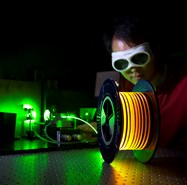Economy
-

Degree apprenticeship in engineering
University of Exeter has joined a partnership between engineering firm Laing O’Rourke and others to offer a part-time civil engineering degree apprenticeship.
Read more >
-

Graphene: the transformative new material driving economic growth
The discovery of graphene at the University of Manchester has led to a rapid global take-up of new technologies, with at least $200 million in recent commercial investment being made in graphene production across 210 companies.
Read more >
-

Fast-acting insulin drugs transforming diabetes treatment
New ‘fast-acting’ insulin drugs, used to treat millions of diabetics worldwide and which generate billions in sales annually, stem directly from work carried out in laboratories at the University of York.
Read more >
-

Leading the world with genome sequencing
Genome sequencing technology developed at Cambridge has generated an annual turnover of over £750 million from an initial public investment in basic research of only £274,196. This means that for every £1 of public investment, the research now delivers £2,735 every year, even without counting the wider economic and social benefits.
Read more >
-

Tackling the obesity challenge with novel low-fat food products
There is no simple solution to the obesity crisis, but what you eat can make a real difference.
Multinational food companies have used research at the University of Birmingham’s chemical engineering department to develop new ranges of low-fat foods that are both highly profitable and are helping to tackle obesity.
Read more >
-

Revolutionising drug management for patients with dementia and Parkinson’s
The Prime Minister has set up a ‘Dementia Challenge’ to transform dementia care, support and research by 2020. Drug trials at Newcastle University have risen to this challenge with dramatic improvements in the quality of life of millions of dementia patients.
Read more >
-

Reducing the economic damage from volcanic ash clouds
The eruption of Icelandic volcano Eyjafjallajökull in 2010 wreaked havoc on Europe’s airways. The rapid spread of a huge cloud of ash led to over 100,000 flight cancellations, at a cost estimated at £3 billion. Researchers at the University of Bristol have helped to reduce the likelihood of this happening again.
Read more >
-

Revolutionising industrial material processing
The integration of lasers into optical fibres by pioneering research at the University of Southampton has led to the creation of a new business sector in fibre laser technology and manufacturing, improving production and manufacturing processes for a huge range of industries.
Read more >
-

Maths research delivering life-saving results
Delays in emergency medical wards are a potential waste of time and resources for hospital managers, but more importantly they can cost lives. Researchers at Cardiff University have used mathematical modelling to identify the causes that lie behind the headlines of ambulance delays and A&E queues.
Read more >
-

Detecting bowel cancer early
One million new diagnoses of bowel cancer are made worldwide each year. This human tragedy is costing the NHS more than £1 billion annually. However, a new, simple and cost effective screening test developed by researchers at Imperial College London has proved so effective that this form of cancer could become a rare disease.
Read more >
-
Out of hours media enquiries
020 3816 1316
-
Dr Tim Bradshaw
tim.bradshaw@russellgroup.ac.uk
020 3816 1300
 X
X
